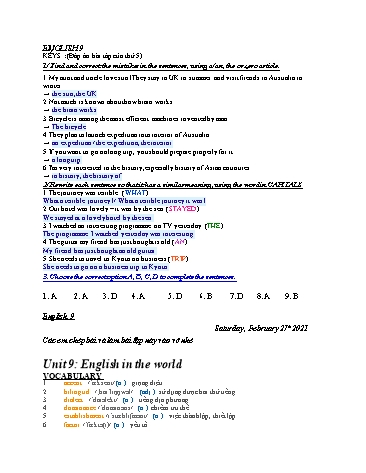Bài tập Tiếng Anh Lớp 9 - Unit 9: English in the world - Năm học 2020-2021
Bạn đang xem tài liệu "Bài tập Tiếng Anh Lớp 9 - Unit 9: English in the world - Năm học 2020-2021", để tải tài liệu gốc về máy hãy click vào nút Download ở trên.
Tóm tắt nội dung tài liệu: Bài tập Tiếng Anh Lớp 9 - Unit 9: English in the world - Năm học 2020-2021

ENGLISH 9 KEYS : (Đỏp ỏn bài tõp của thứ 5) 1/ Find and correct the mistakes in the sentences, using a/an, the or zero article. 1.My aunt and uncle love sun! They stay in UK in summer and visit friends in Australia in winter. → the sun, the UK. 2.Not much is known about how brain works. → the brain works. 3.Bicycle is among the most efficient machines invented by man. → The bicycle. 4.They plan to launch expedition into interior of Australia. → an expedition / the expedition, the interior. 5.If you want to go on long trip, you should prepare properly for it. → a long trip. 6.I'm very interested in the history, especially history of Asian countries. → in history, the history of. 2/ Rewrite each sentence so that it has a similar meaning, using the word in CAPITALS 1.The journey was terrible. (WHAT) What a terrible journey! / What a terrible journey it was! 2.Our hotel was lovely – it was by the sea. (STAYED) We stayed at a lovely hotel by the sea. 3.I watched an interesting programme on TV yesterday. (THE) The programme I watched yesterday was interesting. 4.The guitar my friend has just bought is old (AN) My friend has just bought an old guitar. 5.She needs to travel to Kyoto on business. (TRIP) She needs to go on a business trip to Kyoto. 3. Choose the correct option A, B, C, D to complete the sentences. 1. A 2. A 3. D 4. A 5. D 6. B 7. D 8. A 9. B English 9 Saturday, February 27th2021 Cỏc em chộp bài và làm bài tập này vào vở nhộ Unit 9: English in the world VOCABULARY 1. accent /ˈổksent/ (n.) giọng điệu 2. bilingual /ˌbaɪˈlɪŋɡwəl/ (adj.) sử dụng được hai thứ tiếng 3. dialect /ˈdaɪəlekt/ (n.) tiếng địa phương 4. dominance /ˈdɒmɪnəns/ (n.) chiếm ưu thế 5. establishment /ɪˈstổblɪʃmənt/ (n.) việc thành lập, thiết lập 6. factor /ˈfổktə(r)/ (n.) yếu tố Ex: I don't win a lot of money, so I can’t spend most of it travelling round the world. → If I won a lot of money, I could spend most of it travelling round the world. EXERCISES I. Give the correct form of the verbs in brackets. 1. If he (clean) his windscreen he’d be able to see where he was going. 2. If you drove your car into the river, you (be able) to get out? 3. If you (not belong) to a union, you couldn’t get a job. 4. If I (win) a big prize in a lottery, I’d give up my job. 5. What you (do) if you found a burglar in your house? 6. I could tell you what this means if I (know) Greek. 7. If everybody (give) I pound we would have enough. 8. He might get fat if he (stop) smoking. 9. If he knew that it was dangerous he (not come) . 10. If you (see) someone drowning, what would you do? II. Rewrite the sentences using the conditional type 2. 1. Keep silent or you’ll wake the baby up. → ________________________________________________________________________ 2. Stop talking or you won’t understand the lesson. → ________________________________________________________________________ 3. I don’t know her number, so I don’t ring her up. → ________________________________________________________________________ 4. I don’t know the answer, so I can’t tell you. → ________________________________________________________________________ 5. We will get lost because we don’t have a map. → ________________________________________________________________________ II. RELATIVE CLAUSES (MỆNH ĐỂ QUAN HỆ) A. BẢNG TểM TẮT Ex: John found a cat. Its leg was broken. => John found a cat whose leg was broken. C. RELATIVE ADVERBS (TRẠNG TỪ QUAN HỆ) 1. When: dựng để thay thế cho danh từ chỉ thời gian, When được thay cho at/on/ in + danh từ thời gian hoặc then. Ex: May Day is a day. People hold a meeting on that day. 2. Where: dựng để thay thế cho danh từ chỉ nơi chốn, Where được thay cho at/on/ in + danh từ nơi chốn hoặc there. Ex: Do you know the country? I was born. => Do you know the country where I was born? 3. Why: dựng để thay thế cho danh từ chỉ lớ do. Why thay cho for which. Ex: I don’t know the reason. She left him alone. => I don’t know the reason why she left him alone. EXERCISES: Make the following using relative clauses. 1. Alice is my friend. Alice’s mother died last year. 2. The boy will be punished. He threw that stone. 3. Ann is very friendly. She lives next door. 4. The man is a famous actor. You met him at the party last night. 5. There are some words. They are very difficult to translate. 6. I was looking for a book this morning. I’ve found it now. 7. Is that the car? You want to buy it. 8. Sandra works in advertising. You were talking to her. 9. The little girl ate sweets the whole way. She sat next to me on the coach. 10. Lan is a journalist. Her tape recorder was stolen.
File đính kèm:
 bai_tap_tieng_anh_lop_9_unit_9_english_in_the_world_nam_hoc.docx
bai_tap_tieng_anh_lop_9_unit_9_english_in_the_world_nam_hoc.docx

